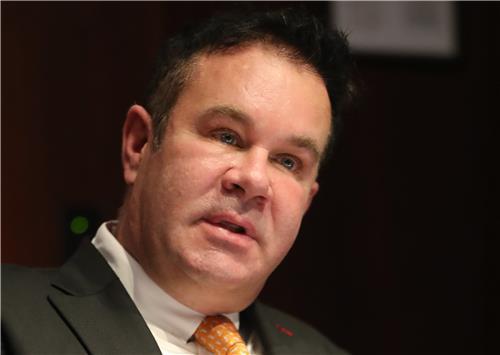 |
Christoffer Drevstad, president of Taurus Systems Korea Co., speaks in an interview with Yonhap News Agency in Seoul on Thursday. (Yonhap) |
German-Swedish defense company Taurus Sytems GmbH hopes to develop a smaller, longer-range air-based cruise missile with South Korea for the country's envisioned KF-X fighters and other aircraft, the firm's Korean branch chief said.
"We are developing Taurus K-2, which is smaller but has the same or even more performance of the current missile," Christoffer Drevstad, president of Taurus Systems Korea Co., said in an interview with Yonhap News Agency on Thursday.
The current version of the air-to-ground precision-guided missile is Taurus KEPD 350K with a flight range of 500 kilometers. South Korea bought around 260 units, most of which are fitted on F-15K fighter jets.
The weapon, known as a bunker-buster missile, can be used to destroy radar stations and other key facilities in North Korea, according to experts.
Drevstad said that the target range of the new missile would be longer than 600 km, and suitable for lighter jets, including KF-X and FA-50 light combat aircraft.
"We intend to develop and produce this missile in Korea with a Korean partner. Currently, we are looking around to find a partner," he said, adding that the company sent proposals a month ago to Korean firms and is awaiting results.
Under the KF-X project, South Korea has been working to develop a home-grown cutting-edge fighter aircraft to replace the Air Force's aging fleet of F-4 and F-5 jets.
Following the design confirmation last year, Korea Aerospace Industries Co. (KAI) got down to the final assembly of a prototype jet, which is expected to be rolled out in the first half of next year. South Korea aims to complete development by around 2026.
But the country decided in 2018 to develop its own stand-off air-launched cruise missile, and is conducting exploratory research.
Drevstad said that South Korea will eventually be able to successfully develop its own bunker buster missile, but it could take more than 15 years as it has not developed this kind of missile before.
"We are estimating around three years (before completing the development) with a Korean partner. We are waiting for requirements (from the Korean government)," he said. (Yonhap)




![[Herald Interview] 'Trump will use tariffs as first line of defense for American manufacturing'](http://res.heraldm.com/phpwas/restmb_idxmake.php?idx=644&simg=/content/image/2024/11/26/20241126050017_0.jpg)

![[Health and care] Getting cancer young: Why cancer isn’t just an older person’s battle](http://res.heraldm.com/phpwas/restmb_idxmake.php?idx=644&simg=/content/image/2024/11/26/20241126050043_0.jpg)

